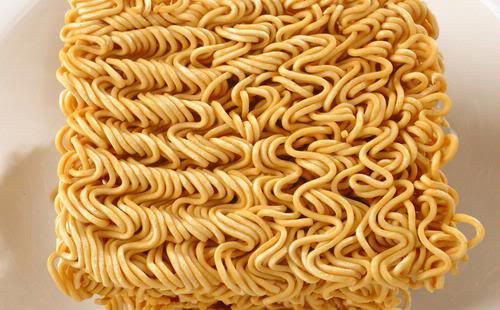Chaotic withdrawal Indofood instant noodle
production occurred in Taiwan because the country questioned the
preservatives that one of them named nipagin or methyl
p-hydroxybenzoate.

In fact, the Codex Alimentarius Commission (CAC), the body that established the Food and Agriculture Organization (FAO) and World Health Organization (WHO) to set food standards, has allowed the use of these preservatives in certain limits.
Food and Drug Supervisory Agency (BPOM), Monday (10/11/2010), stating that Indonesia based on the CAC and allow the use nipagin within certain limits.
According to the BPOM, the use of instant noodle nipagin circulating in Indonesia is still within control. The results of sample tests on instant noodles soy sauce containing nipagin in the last five years shows, none of the content of these preservatives that exceeds the maximum limit.
So what exactly is a substance called methyl p-hydroxybenzoate which is found in soy sauce Indofood instant noodles to worry about Taiwan's Government?
According to information cited by the Food and Drug Supervisory Agency or the United States Food and Drug Administration (FDA), nipagin an additional substance to prevent mold and yeast. Methyl p-hydroxybenzoate is one of a kind parabens or preservatives that are widely used for cosmetics and medicines.
Nipagin has another name, ie methylparaben with the chemical formula CH3 (C6H4 (OH) COO). Other types of parabens are also widely used is propylparaben and butylparaben.
According to the FDA, for a product normally used parabens which amounted to more than one type. Preservatives are usually combined with other preservatives to provide protection against various microorganisms.
Methylparaben is a type of "parabens" which can be produced naturally and is found in some fruits, especially blueberries and other types of parabens. So far, there has been no evidence that methylparaben can cause adverse health effects at certain concentrations in body care or cosmetic use.
The FDA considered, methylparaben as a preservative that is safe or Generally regarded as safe (GRAS) for cosmetics. In Europe, the methylparaben used as a food preservative approved by the European Union with code E-218.
Methylparaben can also be metabolized by soil bacteria so it was really loose. Methylparaben easily absorbed from the gastrointestinal tract or through the skin. This is the hydraulic to p-hydroxybenzoic acid and quickly removed without accumulation in the body.
In every country, the upper limit the use of different nipagin. In the United States, Canada, and Singapore, the maximum levels nipagin is 1,000 mg per kg. The Hong Kong nipagin 550 mg per kg. In Indonesia, POM has set a limit on the use of nipagin 250 mg per kg. [kompas]


In fact, the Codex Alimentarius Commission (CAC), the body that established the Food and Agriculture Organization (FAO) and World Health Organization (WHO) to set food standards, has allowed the use of these preservatives in certain limits.
Food and Drug Supervisory Agency (BPOM), Monday (10/11/2010), stating that Indonesia based on the CAC and allow the use nipagin within certain limits.
According to the BPOM, the use of instant noodle nipagin circulating in Indonesia is still within control. The results of sample tests on instant noodles soy sauce containing nipagin in the last five years shows, none of the content of these preservatives that exceeds the maximum limit.
So what exactly is a substance called methyl p-hydroxybenzoate which is found in soy sauce Indofood instant noodles to worry about Taiwan's Government?
According to information cited by the Food and Drug Supervisory Agency or the United States Food and Drug Administration (FDA), nipagin an additional substance to prevent mold and yeast. Methyl p-hydroxybenzoate is one of a kind parabens or preservatives that are widely used for cosmetics and medicines.
Nipagin has another name, ie methylparaben with the chemical formula CH3 (C6H4 (OH) COO). Other types of parabens are also widely used is propylparaben and butylparaben.
According to the FDA, for a product normally used parabens which amounted to more than one type. Preservatives are usually combined with other preservatives to provide protection against various microorganisms.
Methylparaben is a type of "parabens" which can be produced naturally and is found in some fruits, especially blueberries and other types of parabens. So far, there has been no evidence that methylparaben can cause adverse health effects at certain concentrations in body care or cosmetic use.
The FDA considered, methylparaben as a preservative that is safe or Generally regarded as safe (GRAS) for cosmetics. In Europe, the methylparaben used as a food preservative approved by the European Union with code E-218.
Methylparaben can also be metabolized by soil bacteria so it was really loose. Methylparaben easily absorbed from the gastrointestinal tract or through the skin. This is the hydraulic to p-hydroxybenzoic acid and quickly removed without accumulation in the body.
In every country, the upper limit the use of different nipagin. In the United States, Canada, and Singapore, the maximum levels nipagin is 1,000 mg per kg. The Hong Kong nipagin 550 mg per kg. In Indonesia, POM has set a limit on the use of nipagin 250 mg per kg. [kompas]



Valuable content. Thank you so much. Get to know about the best medical diagnostic facilities in Kerala.
ReplyDelete